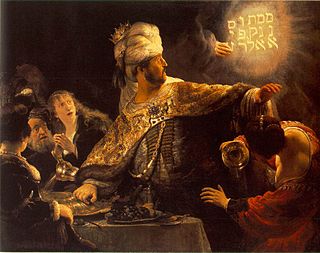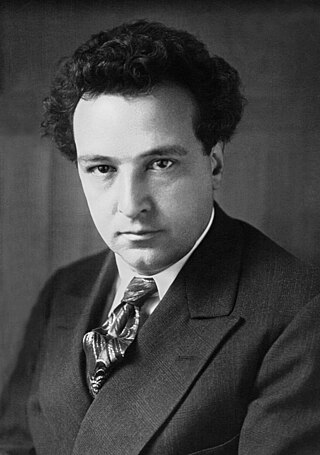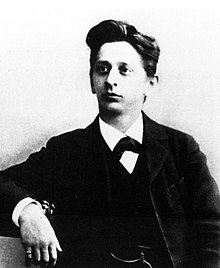
Franz Schreker was an Austrian composer, conductor, librettist, teacher and administrator. Primarily a composer of operas, Schreker developed a style characterized by aesthetic plurality, timbral experimentation, strategies of extended tonality and conception of total music theatre into the narrative of 20th-century music.

Belshazzar's Feast is a cantata by the English composer William Walton. It was first performed at the Leeds Festival on 8 October 1931, with the baritone Dennis Noble, the London Symphony Orchestra and the Leeds Festival Chorus, conducted by Malcolm Sargent. The work has remained one of Walton's most celebrated compositions. Osbert Sitwell selected the text from the Bible, primarily the Book of Daniel and Psalm 137. The work is dedicated to Walton's friend and benefactor Lord Berners.
Samuel Hans Adler is an American composer, conductor, author, and professor. During the course of a professional career which ranges over six decades he has served as a faculty member at both the University of Rochester's Eastman School of Music and the Juilliard School. In addition, he is credited with founding and conducting the Seventh Army Symphony Orchestra which participated in the cultural diplomacy initiatives of the United States in Germany and throughout Europe in the aftermath of World War II. Adler's musical catalogue includes over 400 published compositions. He has been honored with several awards including Germany's Order of Merit – Officer's Cross.

Hans Krása was a Czech composer. He was killed during the Holocaust at Auschwitz-Birkenau. He helped to organize cultural life in Theresienstadt concentration camp.

Eine florentinische Tragödie, Op. 16, is an opera in one act by Alexander von Zemlinsky composed in 1915–16 to a libretto adapted by the composer from a German translation by Max Meyerfeld of Oscar Wilde's unfinished play A Florentine Tragedy.
Hendrik Pienaar Hofmeyr is a South African composer. Born in Cape Town, he furthered his studies in Italy during 10 years of self-imposed exile as a conscientious objector. While there, he won the South African Opera Competition with The Fall of the House of Usher. He also received the annual Nederburg Prize for Opera for this work subsequent to its performance at the State Theatre in Pretoria in 1988. In the same year, he obtained first prize in an international competition in Italy with music for a short film by Wim Wenders. He returned to South Africa in 1992, and in 1997 won two major international composition competitions, the Queen Elisabeth Music Competition of Belgium and the first edition of the Dimitris Mitropoulos Competition in Athens. His 'Incantesimo' for solo flute was selected to represent South Africa at the ISCM World Music Days in Croatia in 2005. In 2008 he was honoured with a Kanna award by the Kleinkaroo National Arts Festival. He is currently Professor and Head of Composition and Theory at the South African College of Music at the University of Cape Town, where he obtained a DMus in 1999.
Raymond Wilding-White ; was an American composer of contemporary classical music and electronic music, and a photographer/digital artist.
Ofer Ben-Amots is an Israeli-American composer and teacher of music composition and theory at Colorado College. His music is inspired by Jewish folklore of Eastern-European Yiddish and Judeo-Spanish Ladino traditions. The interweaving of folk elements with contemporary textures creates the dynamic tension that permeates and defines Ben-Amots' musical language.

Le Roi David was composed in Mézières, Switzerland, in 1921 by Arthur Honegger, as incidental music for a play in French by René Morax. It was called a dramatic psalm, but has also been performed as oratorio, without staging. The plot, based on biblical narration, tells the story of King David, first a shepherd boy, his victories in battle, relationship to Saul, rise to power, adultery, mourning of his son's death, and finally his own death. The work has 27 musical movements consisting of voice solos, choruses, and instrumental interludes. A narrator unifies the work by providing spoken narration of the story of King David.
Franz Limmer was an Austrian composer, conductor and musical performer.
Gary Alan Kulesha is a Canadian composer, pianist, conductor, and educator. Since 1995, he has been Composer Advisor to the Toronto Symphony Orchestra. He has been Composer-in-Residence with the Kitchener-Waterloo Symphony (1988–1992) and the Canadian Opera Company (1993–1995). He was awarded the National Arts Centre Orchestra Composer Award in 2002.
William Mayer was an American composer, best known for his prize-winning opera A Death in the Family.

Kleider machen Leute is a comic opera in a prologue and two acts by Austrian composer Alexander Zemlinsky. The libretto was written by Leo Feld, based on the 1874 novella of the same name by Gottfried Keller.

Es war einmal is a fairy-tale opera in a prologue and three acts by the Austrian composer Alexander von Zemlinsky, composed during 1897-99. The libretto, an adaptation of Marie von Borch's German translation of the fairy-tale play Der var engang by the Danish author Holger Drachmann, was written by Maximilian Singer.

Tigran Yeghiayi Mansurian is a leading Armenian composer of classical and film music, People's Artist of the Armenian SSR (1990), and Honored Art Worker of the Armenian SSR (1984). He is the author of orchestral, chamber, choir, and vocal works which have been played across the world.

Alexander Zemlinsky or Alexander von Zemlinsky was an Austrian composer, conductor, and teacher.

Gloria is a sacred choral composition by Karl Jenkins, completed in 2010. It is an extended setting of the Gloria part of the mass in Latin, on the text of the Gloria in three movements, interpolated with two movements on other texts, Psalm 150 in Hebrew and a song derived from biblical verses in English. Spoken passages from sacred text from four religious traditions are part of the composition. It was published by Boosey & Hawkes in 2010. Gloria is often performed together with the composer's Te Deum.

Coro is a large scale composition for forty voices and forty instruments by Italian composer Luciano Berio.
Symphonische Gesänge, Op. 20 is a set of songs for baritone and orchestra composed in 1929 by Austrian composer Alexander von Zemlinsky.









